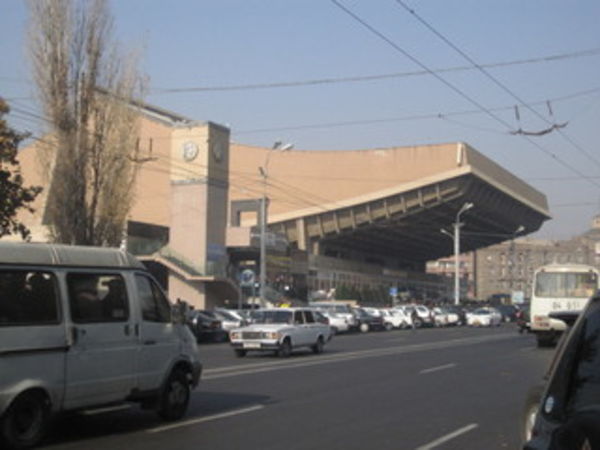
By Abhishek Banerjee, KF13, Armenia
In 1991, the Soviet Union broke apart and Armenia re-established its independence. Declaring independence on 23 August, it was the first non-Baltic republic to secede. However, remnants of its Soviet history can be found throughout the country. Major infrastructure projects implemented under Soviet leadership still stand tall throughout the cities. However, as needs have changed, the buildings have been repurposed to adjust accordingly. One of the more interesting transformations across Yerevan has been the emergence of markets in former industrial or commercial buildings. These markets are basically comprised of dozens of narrow aisles with small storefronts selling clothing, household goods and other daily essentials.

At this point, a couple of the store owners asked me not to take any pictures. My lack of Armenian certainly didn't make it any easier for me to explain what I was trying to do!
These stores often started out as the secondary source of income in the family. However, considering the often low wages in many industries, they have evolved to become the primary source. Many of these entrepreneurs were teachers or factory workers but have since realized this is a better way to take care of their family.
Due to Armenia’s limited manufacturing output, most of these owners have to make a trip to a neighboring country to get their product. Talking to some of the Kiva clients, the general consensus seems to be that Turkish products are perceived to be high quality and as a result, a higher price. However, given the closed border with Turkey, they have to go through Georgia which significantly increases their cost and more importantly, takes time. In recent years, a cheaper (and perceived to the lower quality) alternative has emerged: China. Some of the owners have started to procure from Chinese facilities which are not only lower cost but willing to work with the owners to set up delivery schedules where they don’t have to make more than one or two trips to China.
Armenia is still far from a free and open market system. However, it has taken steps in that direction over the last two decades. Trade is still limited given that the country has closed borders with two of its neighbors. Nonetheless, cheaper manufacturing in other parts of the world and lower transportation costs have brought new products to the Armenian consumer.
It will be interesting to see what happens in the near future. If the border with Turkey were to open, I personally believe many of these owners will prefer to source from there. However, if it does not (and there is no indication of a quick resolution), China will likely continue to take over the Armenian markets over time due to both cost and convenience.
Abhishek Banerjee is a Kiva Fellow (KF13) currently based in Yerevan, Armenia. Want to volunteer with the Kiva Fellows Program? Learn more here and apply to be a Fellow!
Click here to join the Armenia lending group on Kiva!
PREVIOUS ARTICLE
Microsavings 101: How do people save when they earn so little? →NEXT ARTICLE
It’s Always Sunny in Tajikistan →

















